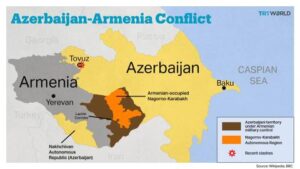What is Nagorno-Karabakh?
Nagorno-Karabakh is a disputed, Armenian-controlled breakaway region inside internationally recognized Azerbaijan. The two former Soviet states have been locked in conflict over the territory for the last four decades. A bloody war in the early 1990s saw an estimated 20,000 people killed, and a million displaced. It was ended by an uneasy ceasefire in 1994, which was never followed by a truce.
How did it all begin?
The conflict begins with Joseph Stalin’s (the former premier of the Soviet Union) decision to place the Armenian majority region of Nagorno-Karabakh in Azerbaijan after the Caucasus was conquered by the Red Army also known as the Azerbaijani extremists in the early 1920s. Neither of the countries was pleased by the decision, but for a few decades, they did not seem to care.
As the USSR empire collapsed, clashes broke out between its Armenian enclave, which sought union with Armenia or independence, and its Azerbaijani minority. Following this, the Armenian enclave in Azerbaijan declared independence in 1991.
Azerbaijan could not stand its borders being violated by foreigners, so they declared war on the enclave. The enclave was supported by the Armenians. Some 30,000 people were killed and about 1m displaced before a ceasefire in 1994.
By 1994, Armenians had succeeded in driving the Azerbaijani army from the Armenian enclave and nearby lands by capturing large areas of Azerbaijan. After the Russian intervention, a ceasefire was established between the two countries.
Since then, both countries have remained inside their line of control marked by landmines and snipers.
The enclave is now ruled by The Republic of Artsakh;
Who backs whom?
The separatist Nagorno-Karabakh government is backed by Armenia. As a member of Moscow’s Collective Security Treaty Organisation (CSTO), Armenia enjoys the formal military backing of Russia, but that does not extend to the disputed territories. Russia, meanwhile, has shown no desire to choose a side — and has even supplied arms to both. In terms of the other neighboring regional powers, Iran is officially neutral, but Turkey is providing weapons and, reportedly, mercenary soldiers to its ally Azerbaijan.

What is this conflict?
Ankara (the capital of Turkey) and Baku (the capital of Azerbaijan) share close cultural ties, given their shared Turkic heritage. On the other hand, Turkey and Armenia have a long history of tensions deepened by Ankara’s constant refusal to admit the 1915 Armenian genocide and the Nagorno-Karabakh conflict.
Due to the Nagorno-Karabakh conflict, Turkey has severed its trade and diplomatic relations with Armenia since 1993.
Russian role in the conflict is somewhat ambiguous majorly because technically the enclave is a part of Azerbaijan and it can do whatever it wants in the region. But if the situation escalates, Russia would defend Armenia. It has maintained close economic ties with both Armenia and Azerbaijan—by supplying weapons to both.
Now?
After the 1994 peace deal, the region has been marked by regular exchanges of fire. In 2016, it saw a Four-Day War before Russia mediated peace. The Organization for Security and Co-operation in Europe (OSCE) Minsk Group, chaired by France, Russia and the US, has tried to get the two countries to reach a peace agreement for several years.
What’s the current conflict?
What began on the morning of September 27, since when each country has claimed to have inflicted serious loss on its opponent. What’s different about the current flare-up is that this is the first time that both countries have proclaimed martial law.
According to the Warsaw-based Centre for Eastern Studies (OSW), the current escalation was “most likely” initiated by Azerbaijan. Media reports have noted that the clashes were possibly a fallout of Azerbaijan’s bid to reclaim some territories occupied by separatist Armenians.
The chairman of Azerbaijan’s National Council has said in a statement that the “military operation of the Azerbaijani army continues to clear the territories occupied by the enemy for almost 30 years”. He said September 27 was a “day of exhaustion” and alleged Armenia has occupied regions around Nagorno-Karabakh with the “direct support” of Russia to create a “security zone”.

Also read: WHY Do Sexual Crimes Happen: A Personal Account
As per the Geo politico experts
The conflict is getting worldwide attention because of the involvement of regional rivals Turkey and Russia. Muslim-majority Turkey backs Azerbaijan, and recently condemned Christian-majority Armenia for not resolving the issue through peaceful negotiations. Turkey recently declared unconditional support to Muslim-majority Azerbaijan.
Russia and Turkey also back opposite sides in the civil wars playing out in Syria and Libya and Turkey’s support for Azerbaijan may be seen as an attempt to counter Russia’s influence in the region of South Caucasus.
Russia’s role is somewhat opaque since it supplies arms to both countries. Other countries, including the US, have limited their participation to appeals for maintaining peace so far. For all countries, the region is an important transit route for the supply of oil and natural gas to the European Union.
What next?
As of now, both sides are standing their ground. The Russian state news agency TASS quoted Azerbaijan President Ikhlam Aliyev as saying that for the fighting to stop, Armenia must unconditionally leave Nagorno-Karabakh.
On Monday, the Armenian government lodged a request with the European Court of Human Rights (ECHR) for an interim measure (applicable only when there is an imminent risk of irreparable harm) against Azerbaijan. It requested the court to indicate to the Azerbaijani government to “cease the military attacks towards the civilian settlements along the entire line of contact of the armed forces of Armenia and Artsakh”.
(With inputs from multiple sources)


